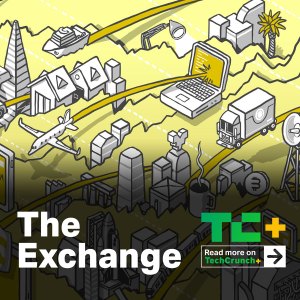What is a startup? It’s a question so picked over at this point that it feels like the only answer is it depends.
That’s fair. In the past, we might have said that once a private-market company earns a $1 billion valuation, it is no longer a startup. But with venture capitalists and crossover investors turning an ever-increasing number of less mature startups into unicorns, that demarcation line has lost its rigidity.
The Exchange explores startups, markets and money.
Read it every morning on TechCrunch+ or get The Exchange newsletter every Saturday.
The $1 billion unicorn term has lost most of its meaning. It was once an indicator of a startup demonstrating abnormal success, the marker of a positive outlier to a degree that the company in question deserved the boosterish sobriquet.
But now, with 907 unicorns out there, the term really just means “startup that should have its shit together.” Which is less useful.
 What about a $10 billion deciding line? Would that be a useful filter to apply to the startup masses, allowing us to filter out the “must pay attention tos” from the “companies heating up” and the “potential but few material results yets”? Yes, but only because there really isn’t a better option.
What about a $10 billion deciding line? Would that be a useful filter to apply to the startup masses, allowing us to filter out the “must pay attention tos” from the “companies heating up” and the “potential but few material results yets”? Yes, but only because there really isn’t a better option.
I am not the first person to noodle on this point: Dan Primack decided to call the group of startups worth $10 billion or more “dragons” earlier this year; Crunchbase News has a great riff on decacorns here from earlier this week that we’ll cite again shortly; and the term “decacorn” is simply not new.
“Unicorn” has lost its heft thanks to massive rarity dilution. If we turn the clocks back to 2013, when Aileen Lee wrote the post inventing the term, there were fewer unicorns being created than there are decacorns today — in a nutshell, that’s how the startup game has changed in the last eight or nine years.
Here’s Lee from the past:
- We found 39 companies belong to what we call the “Unicorn Club” (by our definition, U.S.-based software companies started since 2003 and valued at over $1 billion by public or private market investors). That’s about .07 percent of venture-backed consumer and enterprise software startups.
- On average, four unicorns were born per year in the past decade, with Facebook being the breakout “super-unicorn” (worth >$100 billion). In each recent decade, 1-3 super unicorns have been born.
Even at that time, she was sorting out the “super-unicorn” grouping from the pedestrian unicorns. Thankfully “super unicorn” never took off, and companies worth $100 billion or more pre-IPO are still so rare that the “centicorn“ never made it into our daily lexicon. Still, that $10 billion mark.
Is it rare? My friend and former colleague Gené Teare at Crunchbase News has some analysis out this week on the matter. Here’s the data:
- 2017 decacorns minted: 3
- 2018 decacorns minted: 13
- 2019 decacorns minted: 5
- 2020 decacorns minted: 15
- 2021 decacorns minted: 30
Surely the 2021 number will manage another entry before we reach 2022, making it a greater than 100% gain on the 2020 decacorn result, itself a record at the time.
So we’re seeing not just more decacorns born today than unicorns when the term was created,* but a great many more. This is why the initial hard valuation marker is less useful than it once was.
Still, we need some sort of measuring stick, or else we’ll keep making the silly mistake of calling companies worth $13 billion with 1,300 employees and $130 million worth of revenues “startups.” Companies that have gone through the process of leveling early leaders with more seasoned talent is effectively a grown-up company, and we should find a way to divvy the private markets accordingly.
It would be best to do this by revenue bands, but we cannot because most private companies are afraid of transparency.
What do we have left? The following, I reckon:
- Private company with a less than $1 billion valuation: Startup
- Private company with a greater than $1 billion valuation, but less than$10 billion: Unicorn
- Private company with a greater than $10 billion valuation: Anticipated IPO
Startups are just that — companies that are busy starting up, focused on rapid product iteration and revenue growth over profitability.
Unicorns are wealthy private-market companies, usually still sporting a growth orientation in operational terms, but with more of a focus on building a company that will be IPO-ready in time.
Anticipated IPOs are also just what their name describes: A private-market company that is so wealthy, and likely mature, that it is more than time that it went public.
This is not a perfect set of definitions or nicknames. I doubt that anyone will race to use my turgid “Anticipated IPO” nomenclature. But, at a minimum, it’s something of a framework for us to use to sort private-market companies. Even if the thresholds and definitions are neither clean nor clear, $10 billion is the new $1 billion.
* Note that it appears Lee is discussing only U.S.-based companies in her cadence point (“on average, four unicorns were born per year in the past decade”) thanks to the preceding bullet point. But, even if we broadened the definition of unicorn in her analysis in geographic terms, our point would still hold nicely.






























Comment